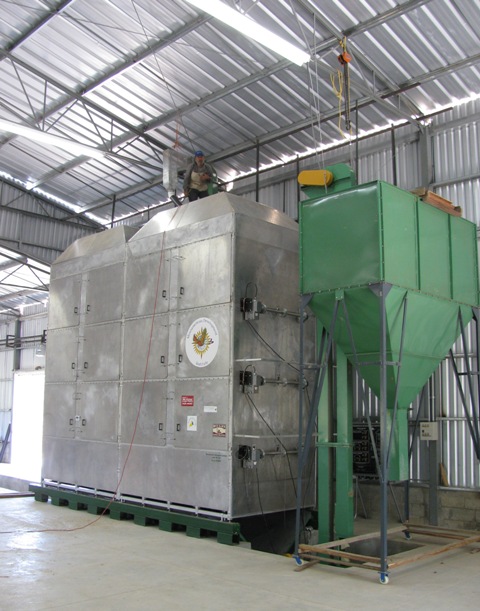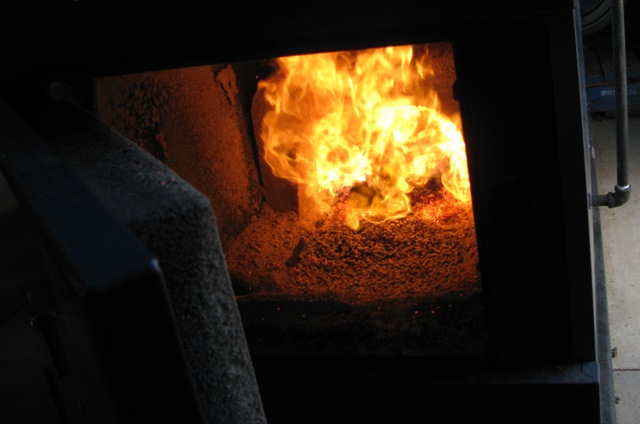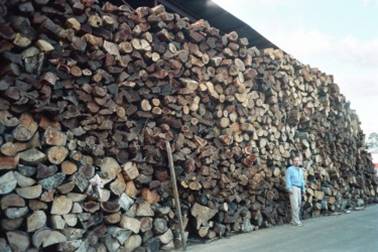
Coffee Drying and Energy
MDI’s hybrid solar/biofuel coffee dryers increase the social, economic and environmental sustainability of cooperatives producing and processing coffee in Mesoamerica. This hybrid system uses a combination of solar thermal and biofuel to dry coffee beans in high-efficiancy drying towers using natural convection. MDI’s alternative energy technology creates an opportunity for the coffee industry to move away from conventional industrial coffee drying methods that are highly energy intensive; in Mesoamerica alone, approximately 6,509 hectares of forest are cut each year to supply wood to fuel conventional dryers.
Escalating energy costs throughout coffee producing regions represent a significant barrier to the economic and environmental sustainability of coffee producing families and cooperatives. In Central America electricity costs have increased nearly 20 percent annually for the past decade. This trend is expected to continue as the region becomes increasingly reliant on fossil fuels for the generation of electricity.
As coffee processing is highly energy intensive, energy costs play a large role in profitability and sustainability for the coffee sector. After labor costs, energy is the most expensive component of coffee production. Nearly 84% of the energy required is consumed during the drying process.
According to the Costa Rican Coffee Institute (ICAFE) and our own regional surveys by the Institute, conventional mechanical dryers consume 10.5- to 12.5-kilowatt hours of electricity for every one hundred pounds of coffee dried. In addition, 0.12 cubic meters of firewood, or firewood
equivalent, is consumed for every one hundred pounds of coffee dried. This level of energy consumption seriously impacts the bottom line for the producer and has serious environmental impact as well. The impact of energy costs is strikingly apparent when analyzing the cost performance of solar/biomass industrial drying systems with conventional drying methods. These industrial solar/biomass drying systems use 80% less electricity than conventional dryers and eliminate the need for fuelwood entirely. The energy costs to dry a 100 lb. sack of coffee is approximately $4.00 with conventional dryers, versus $0.40 with MDI’s solar/biofuel alternative.
Coffee Drying and the Environment
In Mesoamerica, an estimated six thousand hectares of forest are used each year to supply wood to fuel conventional coffee dryers—this loss of forest is roughly equivalent to three square centimeters of forest for each cup of coffee we consume. The linkage of energy and environmental impact for the coffee sector have led to programs to support the introduction of the technology using market demand for environmentally friendly coffee as a driver to overcome initial higher capital investment required for the hybrid solar/biofuel alternative technology.
The opportunity to modernize the aging coffee drying infrastructure faces many challenges including the lack of credit for capital investment for the sector as a whole, and overcoming the nearly one hundred years of experience with the current conventional drying equipment that has remained largely unchanged since the introduction of coffee as an agro-industrial product.
Solar/Biofuel Coffee Drying and Quality
The clean drying technology alternative allows for improvement in the drying process over conventional dryers and patios. The solar technology maintains a drying temperature of 45 to 50 degrees centigrade to avoid harming volatile oils. The solar technology avoids the prolonged drying intervals of five to fifteen days that are required to dry beans on cement or plastic patios, instead drying the beans in 24 hours of continuous operation using biofuel from coffee parchment (coffee husks) during night operation. Prolonged drying intervals encourage the development of microflora – mold and bacteria that severely impact quality. For maximum quality, the coffee is exposed to sun for one day on a patio prior to loading it into the drying chamber to enhance the color and flavor characteristics preferred by the specialty coffee industry.
Try The Sustainable Coffee Created From The Mesoamerican Development Institute Research
- It is the first coffee to be industrially dried using 100% renewable energy technology.
- Eliminates entirely the use of fuelwood in industrial drying.
- Solar/hybrid drying is the key step in achieving carbon-neutral processing.
Donate To the Research!
Your Funding Helps with:
- Increasing sustainability in the coffee industry using innovative clean energy technology and forest-friendly farming methods.
- Helping independent farmer organizations by providing economic security, valuable training and better job opportunities.
- Supporting women in important management positions in Central America.





